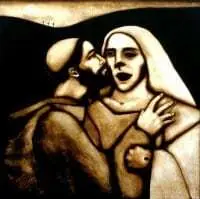Pope Francis had a tremendous insight and caution last week about those things that stifle faith; namely, hidden idols. It got me thinking about what lies in the deeper currents to my own daily distractions.
We all tend to worry, a lot. As such, worry can often be an idol-maker, a habitus, or bad habit when it impedes prayer, trust, and all the other little communions that draw us into radical trust of Christ. Worry can act much like a catalyst creating a flash point condition that binds elements under pressure and heat, to meld a compound of false securities, of a posture that turns to riches and bows low for material solace.
Looking at this early sketch of “Child” by Michael D. O’Brien in his studiObrien online, a work that captures the innocent trust of the child within each person, this realization hit home. Worry can indeed stifle faith and it does so in the silence of daily patterns.
St. Paul in his second letter to the Corinthians encourages the faithful to have security in seeming insecurity. “As having nothing, and yet possessing everything.” 2 Cor 6:10

studiObrien.com
Fr. Hardon in his reflection on the Beatitudes puts poverty into a modern perspective for us.
He writes,
There is no option. Either we practice poverty or we shall not only not be sanctified; we shall not even be saved. It was not a pious platitude but a sober truth when Jesus said how hard it is for the rich person to enter heaven.
Certainly, the Gospels were meant to be lived not only in first century Palestine, but in twentieth century North America. The crucial question is how. The following are some directives. While referring directly to poverty, their underlying principles apply equally to the practice of Christian chastity and charity. Along with poverty, they form the triad of virtues that are mainly on trial in the affluent, sexual and self-preoccupied societies of our times.
1) We must be convinced on faith that the First Beatitude of Christ’s Sermon on the Mount is a divinely revealed truth. Only the poor in spirit will inherit the Kingdom of heaven. We shall be only as zealous about practicing poverty as we are convinced that our salvation depends on our being, and not merely professing to be, poor in spirit.
2) It is not quite true to say that an abundance of worldly possessions is no hindrance to salvation. It is.
3) We must pray to understand how we, in our state of life, with our possessions of money, property, living facilities, food, clothing, means of travel and entertainment are nevertheless to remain poor in spirit.
4) We must be sincere with God in telling Him that we are interiorly detached from the material things we possess or have access to. Self-deception is easy when I have all that I want of earthly satisfactions and then verbally tell God that my heart is not addicted to what I enjoy.
5) We should examine our conscience daily on this internal detachment from what may externally surround us like the air that we breathe. Poverty of spirit is not a figure of speech. It is a living reality. If I am truly practicing the First Beatitude, I will experience something of what it means to be poor.
6) If I am practicing poverty of spirit, I will be industrious. Poor people have to work for a living. “To labor is to pray,” says St. Benedict. And Thomas à Kempis asks, “Why do you want to rest, since you are born to labor.”
7) If I am practicing poverty of spirit, I will be sensitive to the material needs of others. Poverty of spirit means charity of spirit. I want to share what I have with others; and not only of my superfluities, but even of my necessities.
8) A good index of how poor we are is how peaceful we are in spirit. Worry and anxiety about the things of this world are, on Christ’s own testimony, signs of a lack of trust in God’s providence. According to St. Alphonsus Liguori, this means detachment “not only from what is valuable, but also from what is trifling.”
9) Internal detachment from worldly things frees the human heart for attachment to heavenly things. The more time we have in our leisure society, the more time we should give to prayer.
10) The world in which we live needs our witness of poverty. People who know what we believe should see our faith put into practice. It will take much light from God to live among the affluent and yet remain internally poor. We must call upon all the resources of grace to be patient and prudent and kind in our dealings with others without compromising our fidelity to Christ who became a poor Child to show us the way to heaven. –


